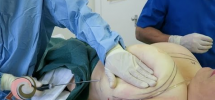Blood Pressure:
Blood pressure is the pressure exerted on the walls of blood vessels while circulating the blood. It is measured in mm Hg and measured in the upper arm. Blood pressure is normally recorded as two numbers that are systolic and diastolic blood pressure. Normal blood pressure for an adult is 120/80 mmHg. The blood pressure is measured by the instrument sphygmomanometer while measuring the blood pressure the nurse will listen to the blood moving through an artery using a stethoscope.

- Systolic Blood Pressure: The pressure exerted on the arteries while pumping blood to the body is systolic Blood pressure. It’s the upper number.
- Diastolic Blood Pressure: The pressure exerted on the arteries while rest between beats is Diastolic blood pressure. It’s the lower number
Ailments:
The blood pressure ailments include high blood pressure and low blood pressure:
- High Blood Pressure: It is indicative of other problems in the body and can have long-term side effects. Higher blood pressure increases the workload of the heart and in the longer run thickens the heart muscles making them weak. People with high blood pressure are prone to heart attacks, strokes and heart failure.
- Low Blood Pressure: The low blood pressure condition is known as Hypotension. It is a concern if the person shows symptoms of lightheadedness, dizziness, weakness or fainting. At times when people stand the pressure suddenly drops this condition is known as Orthostatic Hypotension. The rate of blood flow back to the heart from the veins is reduced by gravity thus decreasing the stroke volume. Other symptoms are eating disorder, toxins, hormonal changes
Routine Checkups:
- The blood pressure should be checked up at least in every two years if it is in the normal range or as suggested by the doctor.
- The blood pressure should be measured every year if the patient suffers from high blood pressure or as suggested by the doctor depending on the medical condition
- If the blood pressure is diagnosed to be more than 140/90 doctors immediate intervention is required
Maintaining a record of Blood Pressure at Home:
- For high blood pressure patients, it is important to monitor the blood pressure at home as per the doctor’s directions so as to check if the medication is effective. Nowadays easy blood pressure measurement instruments are available in the market. It is advisable to avoid caffeine intake, cigarettes, and exercise before measuring your Blood pressure.
- While monitoring the blood pressure at home, it is advised to check it at the same time every day as the readings are more consistent, rather than measuring it at different timings on other days. A journal should be maintained for doctor’s easy reference.




